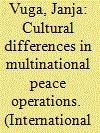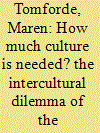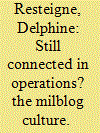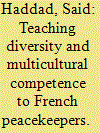|
|
|
Sort Order |
|
|
|
Items / Page
|
|
|
|
|
|
|
| Srl | Item |
| 1 |
ID:
100024


|
|
|
|
|
| Publication |
2010.
|
| Summary/Abstract |
The article is based on research conducted at the Defence Research Centre, emphasizing the qualitative data gathering conducted among members of the Slovenian Armed Forces (SAF) in the UN Interim Force in Lebanon (UNIFIL II) mission in 2007-09. Complex peace operations, as opposed to traditional ones, require a multinational structure and cooperation with several non-military actors/subjects. Trying to be effective, doing the job as well as possible and surviving the situation of living in a limited area with formal and informal interaction with a small number of people takes well-defined rules and procedures as well as the awareness of the importance of integrating mechanisms. Culture, encompassing the military organizational culture as well as the so-called 'national culture', undeniably has a substantial impact on the relations within a given multinational operation. Within the cultural framework, the common language or lingua franca deserves special attention.
|
|
|
|
|
|
|
|
|
|
|
|
|
|
|
|
| 2 |
ID:
100014


|
|
|
|
|
| Publication |
2010.
|
| Summary/Abstract |
This article examines the way that gender values and norms underlie the definition and development of peacekeeping missions, and how, in turn, these might contribute to changing prevailing gender regimes within military forces. The article starts with a revision of the gendered nature of the military, brings in the topic of changing professional identities in modern armed forces, and proceeds with an examination of key issues and contradictions in contemporary discourses on gender and peacekeeping. Based on empirical evidence from a variety of research projects conducted since the early 1990s, and with a special focus on the role and integration of women soldiers in peacekeeping, it questions the extent to which peacekeeping missions, and specifically what has been labelled a new gender regime in peacekeeping, have the potential to challenge previously dominant conceptions and practices of gender roles in military culture. The article stresses the idea that only a context-sensitive analysis will allow us to adequately account for and understand the gender dimension of peacekeeping culture.
|
|
|
|
|
|
|
|
|
|
|
|
|
|
|
|
| 3 |
ID:
100021


|
|
|
|
|
| Publication |
2010.
|
| Summary/Abstract |
Using the Bundeswehr operation in command of the International Security Assistance Force (ISAF) in Afghanistan as an example, this article follows the assumption that German soldiers find themselves in an 'intercultural dilemma'. Intercultural competencies are expected of them in theatre but they are not always able to apply them and the strategic-political level responsible for the mandate hardly incorporates the 'cultural factor'. However, 'intercultural sensitivity with reservations' will not win the 'hearts and minds' of the local population, or help to guarantee sustainable stability in conflict regions such as Afghanistan. Profound appraisal of the role of local cultures should be of central importance to the tactical-operational level during operations abroad as well as to the strategic-political level at home. The article discusses the tactical-operational level in regard to how much intercultural competence Bundeswehr 'peacekeepers' need and what kind of intercultural challenges they encounter in Afghanistan. On a long-term basis, conflict management, peacebuilding and sustainable development can only be achieved in harmony with the people in the area and not against them or over their heads and needs.
|
|
|
|
|
|
|
|
|
|
|
|
|
|
|
|
| 4 |
ID:
100017


|
|
|
|
|
| Publication |
2010.
|
| Summary/Abstract |
Peacebuilding without cultural sensitivity is empty; cultural sensitivity without cosmopolitan values is blind. Sustainability considerations require that peacebuilding approaches are locally accepted, and this local acceptance depends not least on the degree to which these approaches are commensurate with local understandings and cultural practices. The problem with the recommendation of focusing on local cultures, however, is that these practices are neither monolithic nor necessarily compatible with the aim of working towards less violent societies. Some value basis is therefore inevitable. Essentially, peacebuilding agendas need to start with fostering mutual recognition among former adversaries. On the basis of mutual recognition and on the grounds of values such as equality and compassion as framework principles, more detailed guidelines for political and socioeconomic rearrangements can be negotiated, while ideals of discourse ethics partially entail and partially supplement this value ground.
|
|
|
|
|
|
|
|
|
|
|
|
|
|
|
|
| 5 |
ID:
100013


|
|
|
|
|
| Publication |
2010.
|
| Summary/Abstract |
UN peacekeeping rose to prominence as an instrument of international action based on its enacting a root metaphor that promised the reversal of politics as usual and the creation of a more equitable world. Practices developed in traditional peacekeeping created a culture of peacekeeping that reinforced this root metaphor through a linking of strategic policy to actions in operations. This article argues that developments in the way that peacekeeping has been used are undermining the root metaphor such that the cultural inversions associated with peacekeeping are increasingly difficult to maintain, if they can be continued at all. The result is that peacekeeping has been sliding toward recreating earlier practices of imperial policing by placing the concerns of international actors ahead of those of the local communities in which peace operations take place.
|
|
|
|
|
|
|
|
|
|
|
|
|
|
|
|
| 6 |
ID:
100016


|
|
|
|
|
| Publication |
2010.
|
| Summary/Abstract |
This article presents an overview of the relationships between peacekeeping, peacebuilding and conflict resolution with an emphasis on the way in which culture and cultural analysis might be used to develop more effective and sustainable peacekeeping interventions. The article comments on the conceptualization of the role of culture in conflict resolution theory and how this has been used in attempts to address cultural barriers to effective peacekeeping in so-called first-, second- and third-generation missions. While culture has generally been defined as important in theory and practice in terms of understanding differences between actors in conflict environments, the main new argument advanced in the article is that culture, redefined specifically as peace culture, can have a more proactive role in terms of mobilizing energies for sustainable peacebuilding at different stages of the conflict spectrum. More speculatively, the article explores the idea of culture as a contributory factor in the emergence of new forms of cosmopolitan peacekeeping.
|
|
|
|
|
|
|
|
|
|
|
|
|
|
|
|
| 7 |
ID:
100020


|
|
|
|
|
| Publication |
2010.
|
| Summary/Abstract |
With the development of new information and communication technologies, military organizations are confronted with a proliferation of new informal channels used by soldiers, such as military blogs (or 'milblogs'). These consist of small websites created by defence personnel around military topics. Because they have the potential to reach a large audience, milblogs have become influential and, sometimes, controversial, pushing military organizations to be more open but also to try to control them. This article first describes the new forms of communication in the military, both at the institutional and at the individual level. Next it discusses the use of milblogs among Belgian soldiers in the field and the wider role played by the internet in operations, both as an information tool and a way to break the routine of the mission. Finally it examines how these information flows, while offering more diverse perspectives, also compete with official bureaucratic channels and elements of military culture.
|
|
|
|
|
|
|
|
|
|
|
|
|
|
|
|
| 8 |
ID:
100023


|
|
|
|
|
| Publication |
2010.
|
| Summary/Abstract |
This article analyses a cultural transformation taking place in Norwegian units deployed abroad as the framework for these operations shifted from UN to NATO command in the mid-1990s. In UN operations during and shortly after the Cold War, there was a cultural gap between the military at home and the units deployed abroad, and experiences from overseas operations were perceived as without relevance for national defence. After NATO became the preferred framework for Norwegian deployments, national military culture, which focused primarily on war-fighting skills and discipline, replaced the UN culture's focus on non-combat skills and practical problem-solving. This transformation had an impact on the Norwegian units' interaction with local cultures in the deployment area. But, since the identity of individual service members remained primarily linked to Norway and the Norwegian armed forces, the changes were of a practical rather than an ideological or motivational nature.
|
|
|
|
|
|
|
|
|
|
|
|
|
|
|
|
| 9 |
ID:
100025


|
|
|
|
|
| Publication |
2010.
|
| Summary/Abstract |
Through the example of the UN Interim Force in Lebanon (UNIFIL), this article examines how intercultural skills are used by the French military in their daily life during a peacekeeping operation. As an essential part of professional military education and a component of military efficiency, cultural awareness is supposed to play a key role in fulfilling peacekeeping missions. The contention here is that there is a gap between the official discourse on cultural awareness and the way that the military experience their daily life and perceive multiculturalism during operations. Cultural diversity does not feature as a trump card, and national boundaries remain strong, in for example the compartmentalization of areas of operation and the restrictive UN and national rules of engagement. These limit the formal and informal contacts between contingents and with the population.
|
|
|
|
|
|
|
|
|
|
|
|
|
|
|
|
|
|
|
|
|